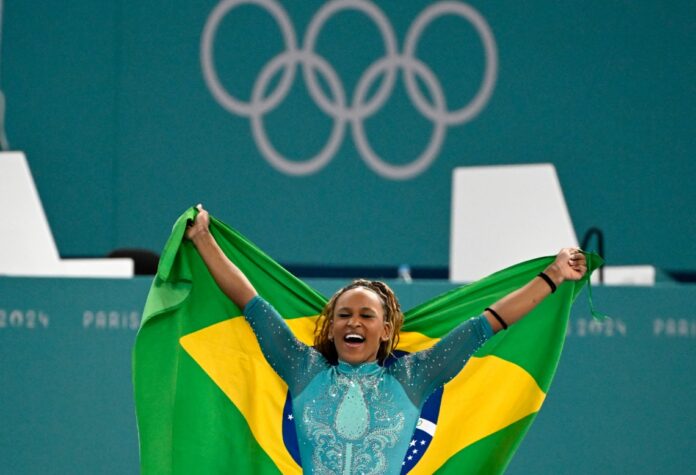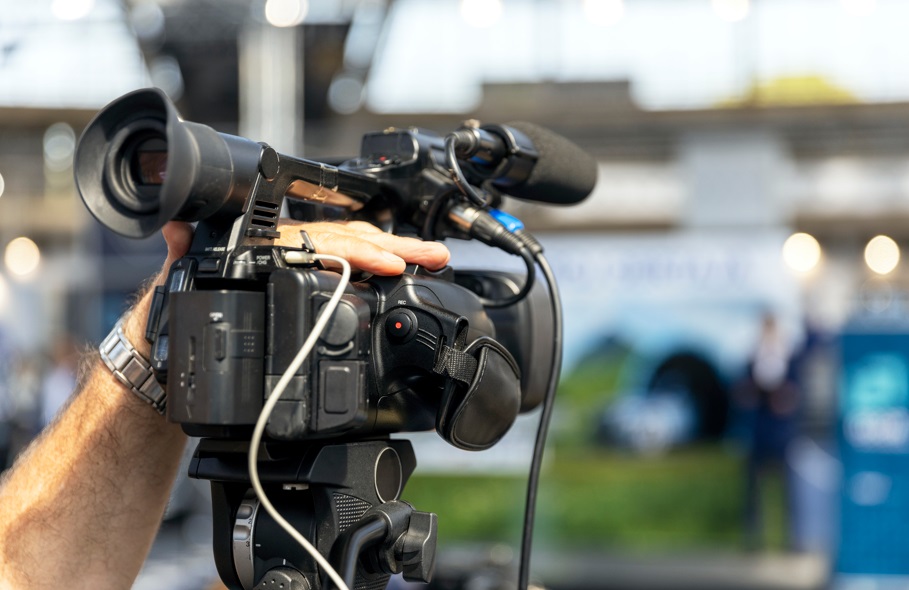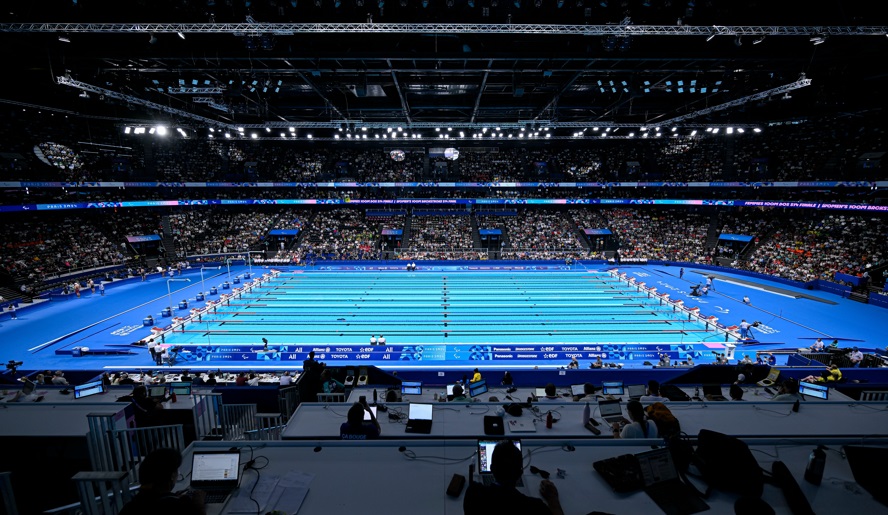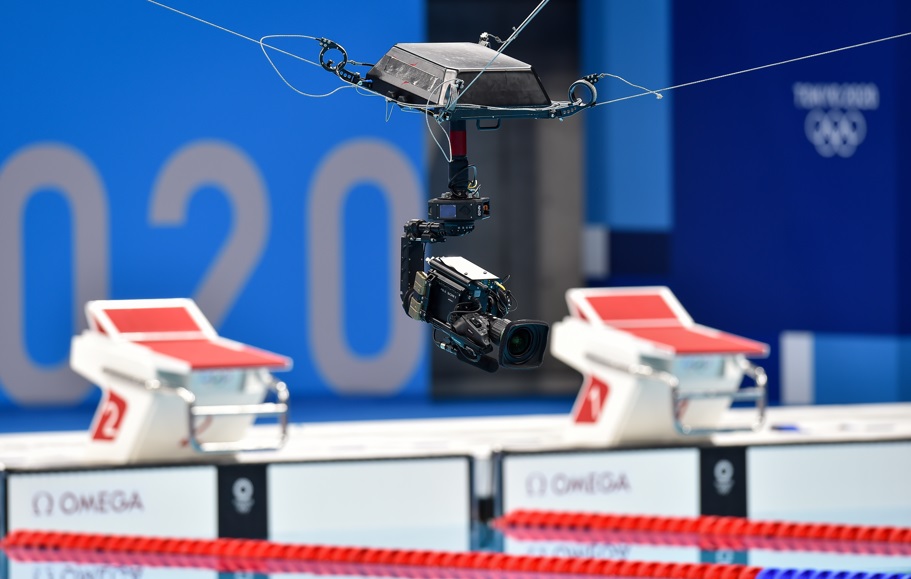
By Chengyi Lin
The last half-century has been characterized by our unceasing drive to assimilate ever-evolving digital technology into every aspect of our lives. The Paris 2024 Olympic Games provided a revealing example of the huge benefits that getting it right can yield.
The Olympic Games is the world’s most celebrated sporting event. The recently concluded Paris 2024 Games hosted more than 10,000 athletes from 206 National Olympic Committees and attracted more than half1 of the world’s population to watch the Games as they unfolded over the course of nearly three weeks.
The Paris 2024 Olympic Games provided a revealing example of the huge benefits that getting it right can yield.
Paris 2024 achieved a critical milestone for the Olympic Agenda 2020+5,2 which tries to drive more progress to transform the Olympics for youth and the new era. What is the role of digital technologies in this critical transformation? How can we ensure that the Olympics engage with the younger generation who are “digital natives” and value instantaneous communication through various digital channels? Our ongoing research with the key Worldwide Olympic Partners (WOP) examined the last four games: the Pyeongchang 2018 Winter Games, the Tokyo 2020 Olympics, the Beijing 2022 Winter Games, and Paris 2024. We went deeply into the behind-the-scenes technology services to understand how digital delivers value to the Olympic transformation.
Considering that the Olympic Games operate in a high-pressure, high-visibility and high-expectations environment – one that is filled with complexity, uncertainty, and intensity – these lessons are valuable to different types of business around the world who are trying to make technologies work for their own transformation.

Focus on Technology Reliability to Conserve Value
In 2024 alone, the world was subjected to a glut of digital failures. Among the most visible ones were the Meta server outage3 that caused Facebook and Instagram to be down for more than two hours globally, as well as the Microsoft crash in which an outage in its CrowdStrike cybersecurity software affected over 8.5 million4 Windows devices worldwide. Even tech giants cannot guarantee the absolute reliability of their technologies.
This is unacceptable for the Olympic Games. As we witnessed during the men’s 100-meter race, American runner Noah Lyles won the gold medal by a 0.005-second margin5. Omega’s technology needs to be extremely accurate and reliable to ensure these results. Actually, to eliminate the frustrations and chaos caused by any technological outages, the International Olympic Committee set a nearly impossible goal: that essential technology services, including cloud and timekeeping, should run successfully 99.999 per cent of the time.
How can the technology providers, such as Alibaba, Atos, Deloitte, and Intel, deliver on this near-perfect promise given the complexity, uncertainty, and intensity of the Olympic Games? The answer is redundancies and testing.
First, all teams built sufficient technology backup systems and dedicated support teams. For example, one from the WOP Alibaba Group built sufficient backup systems around their cloud technologies, ranging from hardware to software. They established multi-copies of local storages and built in both active-backup and active-active instances6 of relational databases. Additionally, Alibaba used load balancers to distribute traffic to multiple back-end servers. To provide sufficient multi-level redundancies without blowing up the budget, Alibaba Cloud also leveraged existing servers from within and cross regions. This also avoided adding headcount to the new server sites.
The International Olympic Committee set a nearly impossible goal: that essential technology services, including cloud and timekeeping, should run successfully 99.999 per cent of the time.
Testing through scenario simulations is critical to make sure the redundancies and the process work well under stress. To do this, long-term WOP Atos built a 1,000-square-meter Integrative Testing Lab7 in Madrid, and completed over 250,000 hours of testing and simulations before June 2024. Similarly, Alibaba also ran five end-to-end rehearsals, including three internal ones for continuous improvements and two technical rehearsals, with the Paris Organising Committee and other technology partners such as Atos, Intel, and Samsung. Intel’s digital twin platform8 also allowed event planners to access the simulations remotely from other parts of the world, so that they didn’t need to travel to Paris multiple times but could still rehearse and improve the events simultaneously.
Although these back-end efforts were all hidden from the public eye, they provided the foundation for a smooth and frustration-free experience.

The 99.999 per cent reliability of the technology not only ensured that little to no value was destroyed through mistakes, accidents, and any other uncertainties, more importantly it helped to save tremendous costs for the games. For business leaders, one lesson from the Paris 2024 Olympics is that digital technologies could allow all stakeholders, including the athletes, hosts, volunteers, broadcasters, event planners, team supporting staff, and many more, all to share the same synchronized information, which significantly reduced the chance of crises, thus conserving value for all the end users.
Guide AI to Improve on Quality, Not Just Quantity
Since the launch of ChatGPT in November 2023, generative artificial intelligence (GenAI) has been helping content creators, such as marketers, to generate various versions of the same idea. The GenAI-generated content may vary in quality, but it compensates in quantity and speed.
The Olympics actually require the opposite use case: less quantity but higher quality.
With 10,714 athletes competing in 329 games across 32 sports9, the Olympic Games organizer hosts an overwhelming quantity of broadcasting contents in the cloud. How different media outlets are able to select the right ones in real time to broadcast through multiple streaming channels is a significant challenge. This is where AI, and GenAI in particular, stepped in.
Such efforts actually started with the Tokyo 2020 Games. Historically, before 2020, broadcasters, such as France Télévisions, NBC, and CCTV, would send their own crew to record a specific match, athlete, or angle of interest. For example, for Rio 2016, NBC sent over 2,000 staff10, including anchors, reporters, editors, camera crew, etc. The BBC, after criticism, sent a reduced number of 45511 for the same year.
Not only are the proprietary videos and images captured not shared with other broadcasters, generating a lot of waste, the overwhelming quantity of recordings can take days or even weeks to sift through. They are also difficult to fit into the various formats of social media platforms.
The Tokyo 2020 Games became the first Olympic Games to be migrated into the cloud.
Cloud technologies help tremendously in this regard. The Tokyo 2020 Games became the first Olympic Games to be migrated into the cloud. Alibaba and Deloitte worked with the Olympic Broadcasting Services (OBS) and media rights-holders (MRH) to implement a new practice: OBS Live Cloud12.
By Paris 2024, two-thirds of booked remote services across 54 broadcasters were onboarded to OBS Live Cloud, which included 379 high-definition live video feeds and 100 audio feeds. Once these recordings were centralized on the cloud, AI could be put to work and was proven to be more than helpful in multiple aspects, including 360 instantaneous rendition and automatic editing into customized versions. The CEO of OBS, Yiannis Exarchos, praised the way that technological innovations push “the way we convey the stories of athletes, sports”13. First, AI could provide a high-resolution 360 digital rendition of significant game moments.
Omega deployed a range of cutting-edge digital equipment, including the reliable Scan’O’Vision MYRIA photo finish camera14, which can take 10,000 digital images per second on the finish line of races to help capture significant game moments. Thanks to AI and its almost instantaneous reconstruction of a 360 rendition of the moment, we got to enjoy the slow-motion, frame-by-frame replay of the 100-meter men’s final, when American athletes Noah Lyles and Fred Kerley and Jamaica’s Kishane Thompson crossed the finishing line nearly at the same time, according to the naked eye.
Based on these successes, the International Tennis Federation is currently considering broadly applying this technology in its future operations for refereeing the challenges and results.
Second, an AI editor like the one deployed by Alibaba15 can edit the multiple camera recordings almost instantaneously and export the short videos into customized versions. In previous games, editors needed to take minutes or even hours to edit critical moves at high quality for replay and analysis. Now, the Alibaba AI editor can slice and dice the full length recording into various short segments and tag each with highlighted information automatically. With the help of facial recognition and object tracking algorithms, the AI editor can pick the right recordings to feature a certain athlete or highlight the key play.
When digital technology, including GenAI, is guided well, it goes well beyond generating quantity. Like the Olympics organizing committee, managers can think about integrating AI into their work flow to significantly enhance value creation by improving the quality of the content generation, user engagement, and operations.

Drive Added Value through Mass Personalization
Young generations engage with the Olympics much beyond traditional onsite and online live viewing16. They want to interact with the games, the athletes, and with each other in real time across various social media platforms. According to unreleased official data, the Paris 2024 Olympics was the first Games where online streaming and viewing through digital media surpassed traditional TV viewers. This presents a significant challenge for the highly complex Olympics.
Without inflating the onsite and remote staff, the International Olympic Committee and the WOP looked to digital technologies for assistance. Deloitte, a long-time WOP, has invested heavily in AI and innovations. In addition to assisting athletes and coaches with personalized training videos and data, the fan data platform17 is another demonstration of the digital value added to user engagements through mass personalization. The data platform collects behaviour data of Olympics super-fans.
At the same time, the GenAI algorithm can simultaneously translate text content into multiple languages, tag the multiple video segments in local languages and, more importantly, combine with Deloitte’s fan data to help MRHs select, edit, and distribute customized content for each country based on their team’s sport categories and the audience popularity. For example, the same women’s singles badminton gold medal match will be broadcast in China by CCTV in Chinese with tailored replay for He Bingjiao, and in Korea by KBS in Korean with tailored content for the gold medallist An Se-young. At the same time, both contents will pay tribute to the Spanish world champion Carolina Marín, who sadly retired from the game due to knee injuries18.
Integrate Digital with Diversity
One major objective of the International Olympic Committee is to leverage AI19 to ensure equal access to the games and data. For example, Deloitte has built an integrated AI solution20 for coaches and athletes around the world to access all the game videos and data for analysis and training.
After automatically editing out the segments21, AI can also edit the same segment into various forms22 that fit the culture, social media channel style, local languages, and preferences. For example, Chinese table tennis fans23 can celebrate Ma Long’s sixth Olympic Gold Medal24 on the podium through WeChat, Douyin, and Kuaishou. and Brazilian gymnastics fans can celebrate the historical moment in Portuguese on Twitter, Instagram, and Tiktok, when Rebeca Andrade won gold25 in the women’s floor final and created a first all-black Olympic gymnastics podium26 with her teammate Jordan Chiles and the US superstar Simone Biles. The mass personalization can also connect individual fans who love the same sport or spirit, even if they come from different cultures and backgrounds. On social media X, even former US first lady Michelle Obama saluted “this beautiful moment of sisterhood and sportsmanship”27.
Besides producing and distributing diverse content from billions of new materials, we also saw AI play a role in rejuvenating the Olympics’ archive. To support gender parity of the Paris 2024 Olympics, one of the WOP partners, Alibaba, dug into the archives and created a video “To The Greatness of Her”28 with AI-recolored still images and reconstructed video recordings. These efforts brought the audience back to those historical Olympic moments and connected with the heroines in the video.
Recently, GenAI has been widely used to improve productivity and creativity29 in generating documents, images, and videos. So far, these require heavy human intervention through prompt engineering and generate much waste. The GenAI algorithm developed for the Olympics Broadcasting Services is fully automated. It can handle large amounts of inputs, in thousands of hours of full-length videos from multiple cameras, and turn them into precisely targeted highlights.
Post-Olympics, these technologies could be applied by various brands to connect them with their own customer databases. This will help brands, retailers, and e-commerce to better engage with their customers with personalized content and promotions30. For example, some of the GenAI algorithms are already in use within Alibaba’s e-commerce platforms31 such as Taobao, TMall, Lazada, and AliExpress, and have generated additional orders32. For managers interested in improving their customer experience, the insights gathered from the consumption data of these personalized contents can further inform their practices around research, design, development, and production, and benefit the entire upstream supply chain.
About the Author
 Chengyi Lin is Affiliate Professor of Strategy at INSEAD and a leading expert on digital transformation and sustainability transition. His research focus on strategic impacts of technologies (e.g. GenAI, renewable energies) and effective organisational changes under uncertainty. Professor Lin serves as board member, CEO advisor, and consultant for multi-nationals and start-ups.
Chengyi Lin is Affiliate Professor of Strategy at INSEAD and a leading expert on digital transformation and sustainability transition. His research focus on strategic impacts of technologies (e.g. GenAI, renewable energies) and effective organisational changes under uncertainty. Professor Lin serves as board member, CEO advisor, and consultant for multi-nationals and start-ups.
Reference:
-
Olympics President: Paris 2024 on track to reach ‘more than half the world’s population’. 07 August 2024. 365. https://www.ibc.org/news/olympics-president-paris-2024-on-track-to-reach-more-than-half-the-worlds-population/11205.article
-
Olympic Agenda 2020+5. 2020. International Olympics Committee. https://olympics.com/ioc/olympic-agenda-2020-plus-5
-
Meta’s Facebook, Instagram back up after global outage. 06 March 2024. Reuters. https://www.reuters.com/technology/metas-facebook-instagram-down-thousands-downdetector-shows-2024-03-05/
-
Microsoft says 8.5M Windows devices were affected by CrowdStrike outage. 20 July 2024. Tech Crunch. https://techcrunch.com/2024/07/20/microsoft-says-8-5m-windows-devices-were-affected-by-crowdstrike-outage/
-
S. Runner Noah Lyles Wins 100 Meter Olympic Gold—By Just 0.005 Seconds. 04 August 2024. Forbes. https://www.forbes.com/sites/mollybohannon/2024/08/04/us-runner-noah-lyles-wins-100-meter-olympic-gold-by-just-0005-seconds/
-
The Enterprise Multi-Active Disaster Recovery System: Construction Ideas and Best Practices in the Cloud-Native Era. 16 December 2021. Alibaba Cloud. https://www.alibabacom/blog/the-enterprise-multi-active-disaster-recovery-system-construction-ideas-and-best-practices-in-the-cloud-native-era_598361
-
Atos supporting athletes and technological innovation on road to Paris 2024. 21 July 2023. International Olympics Committee. https://olympics.com/ioc/news/atos-supporting-athletes-and-technological-innovation-on-road-to-paris-2024
-
Digital Twins Platform Simplifies Venue Planning. Intel. https://www.intel.com/content/www/us/en/customer-spotlight/stories/digital-twinning-olympics-customer-story.html
-
Paris Olympics 2024. International Olympics Committee. https://olympics.com/en/paris-2024
-
BBC staff for Rio 2016 Olympics to be 40% down on 2012 Games. 07 April 2016. The Guardian. https://www.theguardian.com/media/2016/apr/07/bbc-staff-rio-2016-olympics-2012-games-nbc
-
BBC staff for Rio 2016 Olympics to be 40% down on 2012 Games. 07 April 2016. The Guardian. https://www.theguardian.com/media/2016/apr/07/bbc-staff-rio-2016-olympics-2012-games-nbc
-
Alibaba, OBS partner on AI-fueled OBS Cloud 3.0 for Paris 2024. 26 July 2024. TVB Europe. https://www.tvbeurope.com/media-management/alibaba-obs-partner-on-ai-fueled-obs-cloud-3-0-for-paris-2024
-
IOC President praises broadcast operations as Paris 2024 reaches record audiences. 04 August 2024. International Olympics Committee. https://olympics.com/ioc/news/ioc-president-praises-broadcast-operations-as-paris-2024-reaches-record-audiences
-
OMEGA brings its cutting-edge technology to Gangwon 2024 as Official Timekeeper. 23 January 2024. International Olympics Committee. https://olympics.com/ioc/news/omega-brings-its-cutting-edge-technology-to-gangwon-2024-as-official-timekeeper
-
Alibaba Releases New AI Video Editor ‘Aliwood’. 27 April 2018. Alizila. https://www.alizila.com/alibaba-releases-new-ai-video-editor-aliwood/
-
The Olympic change: How young viewers (and athletes) made Olympic media evolve. Anything is Possible. https://aip.media/blog/young-viewers-changing-olympic-media/
-
Power Behind Paris 2024: Deloitte Pushes Olympics Innovation. 05 July 2024. Technology Magazine. https://technologymagazine.com/articles/power-behind-paris-2024-deloitte-pushes-olympics-innovation
-
Paris 2024: Heartbreak for Spain’s Carolina Marín as badminton star faces devastation. 04 August 2024. International Olympics Committee. https://olympics.com/en/news/paris-2024-devastation-spain-badminton-star-carolina-marin
-
Olympic Agenda. International Olympics Committee. https://stillmed.olympics.com/media/Documents/International-Olympic-Committee/AI/Olympic-AI-Agenda.pdf
-
AI at the Olympics. Deloitte. https://www2.deloitte.com/us/en/pages/consulting/articles/ai-and-the-olympics.html
-
Video AI: Next-Generation Intelligent Video Production. 27 November 2018. Alibaba Cloud. https://www.alibabacloud.com/blog/video-ai-next-generation-intelligent-video-production_594220
-
AI at the Olympics. Deloitte. https://www2.deloitte.com/us/en/pages/consulting/articles/ai-and-the-olympics.html
-
Tiktok. https://www.tiktok.com/@zhongguoqingnianbao/video/7401502332749368581
-
Tiktok. https://www.tiktok.com/@tabletennis_malong35/video/7401454403363884296?is_from_webapp=1
-
Tiktok. https://www.tiktok.com/@editss2093/video/7399675990747761925
-
Simone Biles on first all-Black Olympic gymnastics podium: “We knew the impact it would make.” – Exclusive. 04 August 2024. International Olympics Committee. https://olympics.com/en/news/simone-biles-on-first-all-black-olympic-gymnastics-podium-we-knew-the-impact-it-would-make-exclusive
-
I’m still not over this beautiful moment of sisterhood and sportsmanship!. 06 August 2024. Twitter. https://x.com/MichelleObama/status/1820812676819190068?t=uQKF8HeexpsVdQASg561Mw&s=19
-
To the Greatness of HER. August 2024. https://www.youtube.com/watch?v=Aso1wqRN5Io
-
How Generative AI Can Augment Human Creativity. 09 August 2023. Harvard Business Review. https://hbr.org/2023/07/how-generative-ai-can-augment-human-creativity
-
The Pragmatist’s Guide to GenAI in E-Commerce. 14 June 2024. BCG. https://www.bcg.com/publications/2024/pragmatists-guide-to-genai-in-ecommerce
-
Alibaba bets on gen AI tools for overseas merchants, executive says. 10 July 2024. Reuters. https://www.reuters.com/technology/artificial-intelligence/alibaba-bets-gen-ai-tools-overseas-merchants-executive-says-2024-07-09/
-
Alibaba: Generative AI Tools Drive 30% Increase in eCommerce Orders. 10 July 2024. PYMNTS. https://www.pymnts.com/news/retail/2024/alibaba-generative-artificial-intellilgence-tools-drive-30percent-increase-ecommerce-orders/





























![“Does Everyone Hear Me OK?”: How to Lead Virtual Teams Effectively iStock-1438575049 (1) [Converted]](https://www.europeanbusinessreview.com/wp-content/uploads/2024/11/iStock-1438575049-1-Converted-100x70.jpg)




